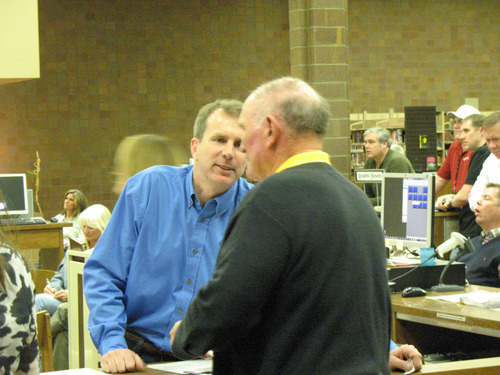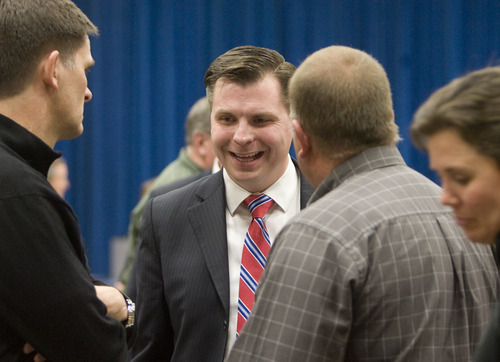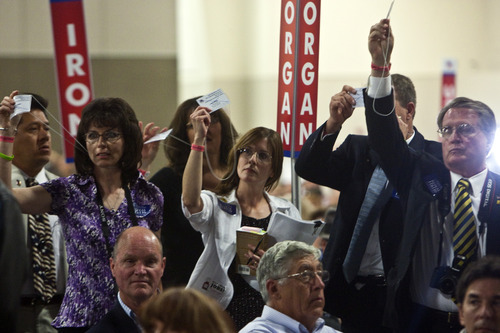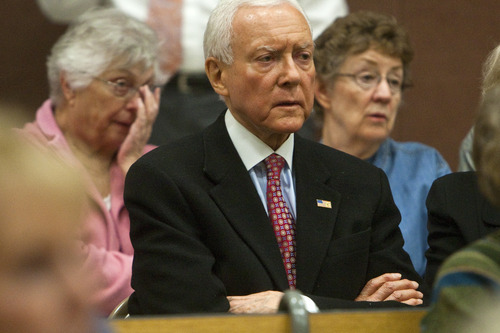This is an archived article that was published on sltrib.com in 2012, and information in the article may be outdated. It is provided only for personal research purposes and may not be reprinted.
In what is likely a good omen for Sen. Orrin Hatch, about seven of every eight delegates just elected to this year's state Republican Convention are newcomers.
So gone are most of the upset tea partiers who dumped 18-year-incumbent Sen. Bob Bennett in 2010 for not being conservative enough. A Salt Lake Tribune poll of delegates back then also found that only 19 percent of them had wanted to retain Hatch.
"I think it's very good" for Hatch, said his campaign manager, Dave Hansen. "Obviously, the last convention eliminated Senator Bennett. So having a new set of delegates means they likely are more in favor of keeping Senator Hatch in office."
The Tribune compared a list of newly elected delegates with those who served in 2010. It found that only about 13 percent were elected as delegates in both years: about 500 of some 3,850 listed so far.
"I'm really surprised. I don't think we've ever seen that many new delegates," said Utah Republican Party Chairman Thomas Wright. He noted delegates were elected at caucuses last week where an estimated 120,000 to 150,000 people attended statewide, or double to triple the crowds in 2010.
"The caucus system has been accused of being an insiders' game decided by the same fringe people. That accusation can't be made anymore," Wright said. "There's a bunch of new people. It just shows that if you show up and participate, your voice will be heard."
Hatch's campaign spent $3 million-plus in the past year largely aiming at getting supporters to caucuses — while groups for and against him spent more than $1.5 million. The GOP invested $300,000 in a go-to-caucus campaign. And The Church of Jesus Christ of Latter-day Saints had letters read over the pulpit for three weeks running urging attendance at caucuses of both parties, saying they are more representative if more people participate.
Conservative state Rep. Chris Herrod, R-Provo, one of nine Republicans running against Hatch, conceded that all the new delegates add up to good news for Hatch.
"I didn't think he could do it, but he was able to stack the delegates more in his favor. … You can do a lot with $5 million," Herrod said.
But Herrod also said the race is far from over, and said he and others are working hard to meet and persuade delegates. "We find that many of them thought it was only a two-way race between Hatch and [former state Sen. Dan] Liljenquist. We are finding that many are open to listening to us," Herrod said.
Liljenquist's campaign chairwoman, Holly Richardson, said Liljenquist is packing delegates into events he is holding, and says many who were leaning or committed to Hatch are changing their minds. "We are very confident that we will make it out of the convention," she said.
If no candidate receives 60 percent or more of the delegate vote, the top two candidates advance to a June primary.
Kelly Patterson, director of Brigham Young University's Center for the Study of Elections and Democracy, says he believes all the new delegates are good news not only for Hatch but, perhaps, other incumbents, too.
"It is unlikely that the new delegates have an equal commitment to the tea party and its aims," he said. "This probably also means the delegates may be less hostile toward incumbents."
Scott Ericson, campaign manager for Gov. Gary Herbert, said he thinks the high turnout at caucuses and all the new delegates bode well for Herbert. "The governor has a very high approval rating among people all over the state," and he said higher caucus turnout likely resulted in delegates who will reflect popular will.
But other GOP candidates in the Utah governor's race say they are finding that most of the competition for state delegates focused on the U.S. Senate race, leaving the field wide open in other contests.
"In all the calls I've made — and I've made a lot of them — I've only had two people tell me they are strongly for Gary Herbert," said David Kirkham, a tea party leader and one of the Republicans opposing Herbert. "I think the race [for convention delegates] was really over Senator Hatch," and many delegates had not closely studied other races.
Morgan Philpot, another Republican challenger of Herbert, agreed.
"I think if the governor had done his work before the caucus like Senator Hatch did, it would probably be trouble," he said. "But he didn't. … I think there is going to be a primary for sure."









